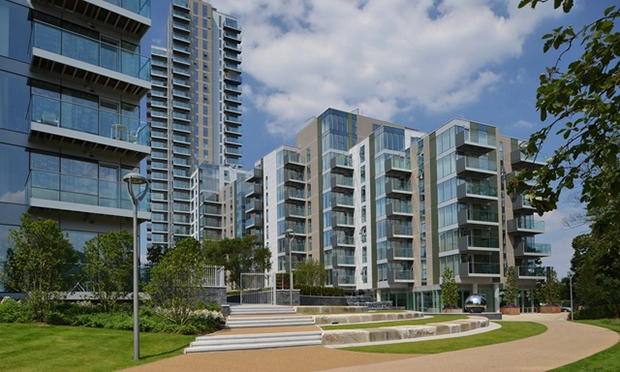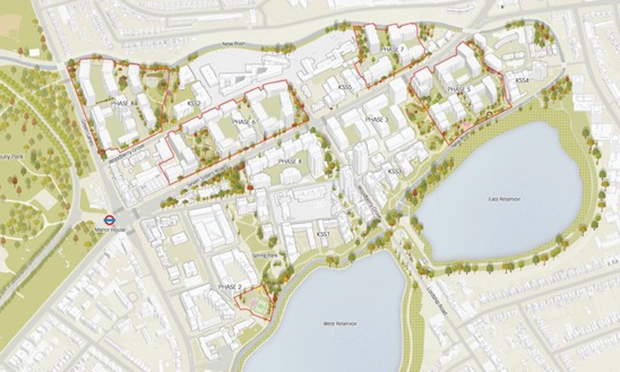Critics round on Woodberry Down plans as next phase narrowly wins approval

Part of the Woodberry Down regeneration scheme. Photograph: Hackney Council
The next phase of a major regeneration project at Woodberry Down Estate was approved by a whisker in bizarre cirumstances last week.
With Labour councillors on the planning sub-committee split, a peculiar rule left Cllr Clare Joseph (Lab) unable to cast a potentially deciding vote because she had arrived 10 minutes late.
Another quirk saw Cllr Jessica Webb’s (Lab) vote effectively counted twice because she was in the chair.
The result was that Phase 4 of the scheme, which involves the demolition of buildings and the construction of 511 homes by developer Berkeley Homes, was decided by five members of a 16-person committee.
A number of councillors were not present, and of those who did turn up, Cllrs Webb and Michael Desmond (Lab) voted in favour.
Cllrs Jon Narcross (Lab) and Clare Potter (Lab) voted against, while Cllr Michael Levy (Con) abstained.
After her late arrival, Cllr Joseph objected vociferously to the planning application, which had been recommended for approval by Town Hall officers.
Former Labour councillor Vincent Stops, who was cabinet member for planning when the redevelopment of Woodberry Down was first being considered in the early noughties, also made clear his opposition.
Stops noted that the original scheme included substantial restriction of vehicular traffic on adjacent Seven Sisters Road, and that these have been abandoned in the current plans.
“I’m here to remind members that a key move has always been the narrowing of Seven Sisters Road from six to four lanes,” he said.
“This, to connect the estate, reduce severance [barriers the road creates between parts of the community] and other impacts of a six-lane road. It would benefit thousands of local residents.
“This was agreed by Berkeley – I think they still agree with it – by Transport for London (TfL) and by Hackney Council.
“This committee agreed a substantial payment in 2013 as part of the overall masterplan development. The proposal was for – is for – a tree-lined boulevard along Seven Sisters Road.”
Stops added: “The money was not for TfL to do what it chose to do, and effectively what it wants to do is to keep the width and create a bike lane and all the paraphernalia of inaccessible bus stops with cycles passing through the pavement.
“If TfL wishes to do something else, it can, but the money from this development should be spent to benefit residents or, if not, on affordable homes.”

The Woodberry Down masterplan. Image: LDS
Other aspects of the proposal have also been criticised on environmental grounds in the council’s own report on the scheme, which notes: “A number of opportunities which would have considerably lowered both embodied and operational carbon footprints have not been implemented.
“We do not currently have the policies in our local plan to secure further embodied and operational carbon savings – the scheme is compliant but does not align with the best industry practice and therefore can’t be considered exemplary.”
Voices were also raised at the meeting over concern with the reduction in council housing that the development will entail.
Of the 511 flats to be built on the site, 289 (57 per cent) will be offered for private sale, 132 (26 per cent) will be sold on an ‘intermediary’ or shared ownership basis, and only 90 (18 per cent) will be social rented housing.
This replaces 144 existing council flats on the site, and it means that the scheme falls foul of the council’s policy that new developments should include at least 50 per cent affordable housing.
The Woodberry Down Community Organisation (WDCO) objected to the plans on the grounds on this basis, and also due to the proposed creation of private gardens in lieu of public space.
Speaking on behalf of the WDCO, Geoff Bell, said: ‘This is the first time we have asked for conditions to be placed on any part of the regeneration. We have never been a ‘no’ organisation. Indeed, we believe our proposals here are constructive.
“First on social homes: 144 social homes are being knocked down, and 90 are being built. […] This follows a similar loss in Phase 3, and a loss of 200 social homes from the first to the second masterplan.
“We were promised these losses would be made up. Instead, the problem is made worse in Phase 4, and indeed worse in the draft third masterplan.”
Later, in response to questions from the committee, Bell said: “I think the promises [on affordable homes] and the service charges have soured relations between WDCO and Berkeley Homes.
“I once went to the United States to speak of the virtues of the partnership which we had built in Woodberry Down. I would not do that now, because I believe we have been given too many promises that have not been kept, and too many issues have been avoided.”
“It is no longer a community-led regeneration,” he added.
Woodberry Down Estate lies on the northern border of the borough and was built between the 1940s and the 1960s as one of the largest housing estates in Europe.
Redevelopment began in 2009 with the aim of revitalising the flats and increasing the number of housing units. The council involved a private developer in order to keep its own costs down.
